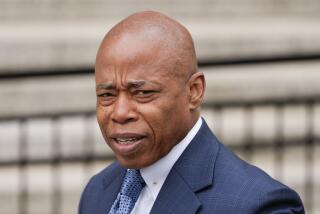Jury Deadlocks 9-3 on Death Penalty in Murder at Motel
- Share via
A San Fernando Superior Court jury that last month convicted J. D. Adams Jr. of murdering a Sylmar motel manager announced Thursday that it could not decide whether Adams should receive the death penalty. The jury said it was hopelessly deadlocked, 9 to 3, in favor of recommending that Adams be executed.
Judge John H. Major ordered a mistrial in the penalty phase of the murder trial. Prosecutors must now decide whether to ask another jury to decide the penalty for Adams, which attorneys in the case said would require another three-month trial.
Adams was convicted of fatally stabbing Sylmar Motel 6 manager Kenneth Holbrook during a robbery on July 22, 1982.
In death-penalty cases, only after jurors convict a defendant do they hear evidence on whether the defendant should be executed or ordered to serve life in prison without possibility of parole.
If prosecutors give up seeking the death penalty, Major could sentence Adams to life in prison without parole, Deputy Dist. Atty. Frederick G. Stewart said.
Prosecutor Disappointed
“I’m disappointed that the jury was not able to arrive at a verdict,” Stewart said. “It’s a possibility that we’ll retry it, but I can’t even say at this point.”
Stewart said the decision will be made by top-ranking officials in the district attorney’s office, including Deputy Dist. Atty. Curt Livesay, who is responsible for overseeing prosecution of the county’s death-penalty cases. Stewart said a decision will be made before a scheduled Dec. 2 hearing.
Adams, 26, was convicted Oct. 7 of first-degree murder, attempted murder and six counts of robbery after witnesses testified that he killed Holbrook, stabbed Holbrook’s wife, Clyda, and robbed five other people during a one-night crime rampage in the San Fernando Valley and Hollywood.
One of Adams’ accomplices, 26-year-old Chester Longmire, was convicted of the same charges, but prosecutors did not seek the death penalty against him because witnesses testified that he only drove the car and did not attack any victims.
Separate juries hearing the cases against Adams and Longmire could not reach verdicts on an a murder count and robbery charge against each man stemming from the fatal stabbing of Joseph Gulvas on a Hollywood street the same night.
A third defendant, James E. Jennings, 24, pleaded guilty to murdering Holbrook and Gulvas and testified against Longmire and Adams under a plea bargain calling for him to receive a sentence of no more than 25 years to life. Jennings said he participated in the robberies but left Adams alone with all the victims before they were stabbed.
Adams testified during his trial that he left Jennings alone in the room before the Holbrooks were stabbed. He denied any connection with Gulvas’ death.
Jurors deliberated Adams’ fate for a week before announcing their deadlock. Panel members said after the mistrial that the plea bargain with Jennings steered some of them away from the death penalty.
Widow’s Testimony
Two jurors, who asked not to be identified, said they believed Jennings, not Adams, may have stabbed the Holbrooks, despite Clyda Holbrook’s testimony that it was Adams who plunged a knife into their backs as they lay on the floor.
“I think Jennings was the leader all along,” one juror said. “It just doesn’t seem fair that Jennings got himself that light sentence and Adams didn’t.”
Defense attorney Walter Krauss told jurors that, before the trial began, Adams turned down a prosecution offer that would have allowed him to plead guilty in return for a sentence of life in prison without possibility of parole.
Other jurors said the three holdout jurors had sympathy for Adams’ poverty-stricken background.
“They just felt the guy had a poor start,” juror Betty Whitehead of Canyon Country said. “I think they felt it was a severe enough penalty to put him in jail for life.”
The jurors who voted against the death penalty declined to be interviewed.
Krauss said he counts the deadlock as a victory for Adams.
“It’s a victory in that they didn’t give him a death penalty,” Krauss said. Prosecutors “offered him life without parole before. Nothing has changed factually. I don’t see why they can’t offer it to him again.”
Stewart, however, said a retrial on the penalty issue would give prosecutors another chance to prove Adams guilty of murdering Gulvas. A new jury, however, could not reverse Adams’ convictions on the other charges.
More to Read
Sign up for Essential California
The most important California stories and recommendations in your inbox every morning.
You may occasionally receive promotional content from the Los Angeles Times.













